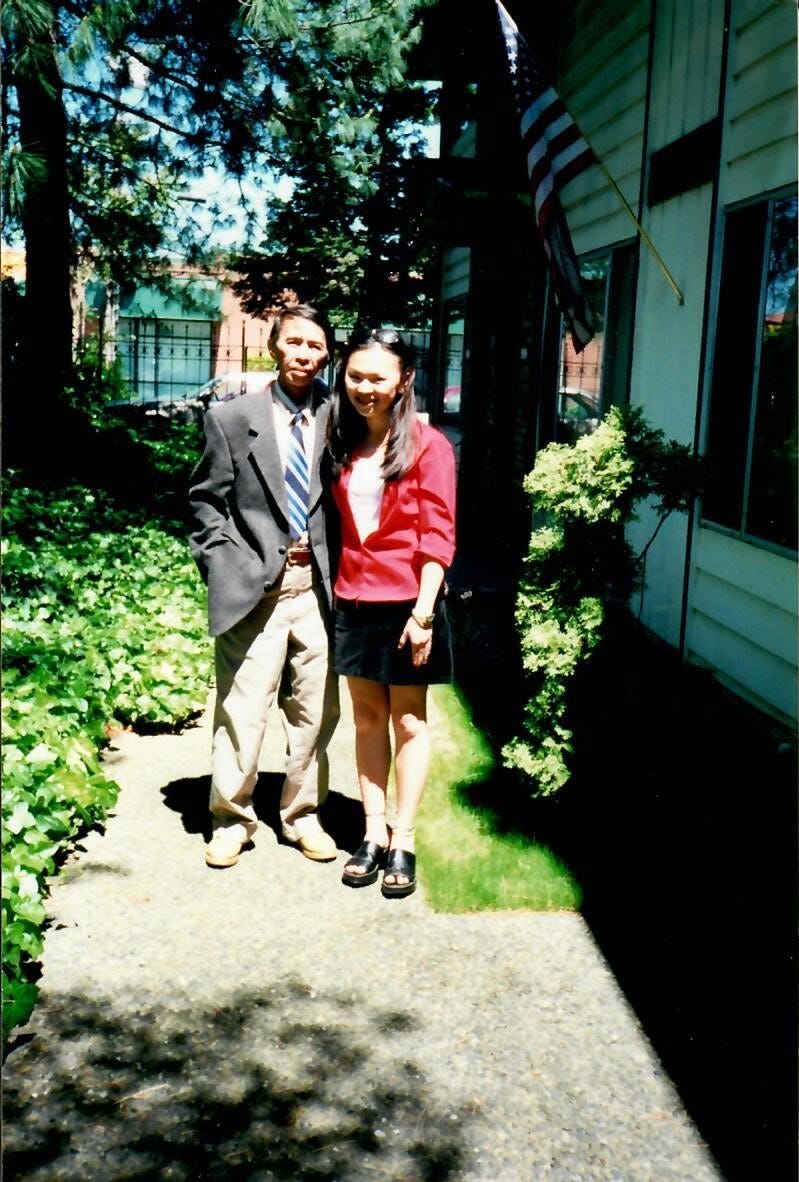Shelter Among Sisters
As a grieving college freshman, Hoang Samuelson found comfort and community in an unlikely place — one she'd soon leave.
Years ago, on the cusp of adulthood and grief, looking for a place to belong, I found solace and friendship amongst a group of young women. It all began with a toothache.
***
In my tiny dorm room underneath my cotton candy pink striped blankets, I clutched my stomach and ground my teeth, wondering what I’d done to deserve such pain.
This was no ordinary toothache. The pain felt like extra sharp knives jabbing my entire mouth for hours, but really, it was just one tooth—my right molar. It had made its appearance several days prior, and I’d dismissed the soreness it as nothing more than a temporary response to stress. Finals were approaching, and I had yet to study. The solution, I thought, was to simply take Tylenol. Unfortunately, it did not help. Nor did doubling the dose.
From across the room, Nayumi, my Japanese roommate, saw the precarious state I was in. “Here, take this,” she said, handing me a nondescript white pill. By then, the pain had worsened, and even though I didn’t know what the pill was, other than what she told me—that it was a pain reliever—I took it anyway, so desperate for the toothache to go away that I would have taken anything that promised relief.
It was November 2003, and I was a freshman at Oregon State University. My father, to whom I was very close, had passed away a few months prior, and I wanted to stay as far away from home as possible. Halfway through my senior year of high school, I learned that he had been diagnosed with late-stage lung cancer. To everyone’s surprise, it was very late stage; he passed away less than six months after he was diagnosed. The last time I saw him was at the Portland International Airport. He was heading back to Vietnam, ostensibly for medical treatment—because despite American medical care being better, his health insurance wouldn’t cover his bills here—but maybe also because he knew he was dying. But we all knew that the Vietnamese medical system did not match the high quality medical care in the United States.
Still, he left anyway. That day at the airport, as we looked into each other’s eyes, he told me to be a good girl, to work hard, and continue to do well in school—the simple, cliché things that parents tell their kids when they don’t know what else to say. I nodded, we parted, and that was it.

Without my dad, I was lonelier than ever before. And I wanted nothing to do with Portland. It brought on too many memories with him. So I applied to colleges as far away as possible. One in Pennsylvania and one in Corvallis. It never occurred to me that I could’ve applied to more schools, but at the time it was all I knew how to do. I was accepted to Oregon State.
***
I arrived on a breezy day in early September, full of excitement and idealistic expectations. Despite my anxiety over being away from home for the first time, I was ready for anything. Or so I thought. I settled into one of the co-ed dorms on campus, paired with Stephanie, a girl from Salem who seemed pleasant at first. Only several weeks later, when she applied for a transfer to a different room, claiming that she wanted to share with a friend, and began to suggest that I’d be better off without her, did it occur to me that we were never going to be friends.
I was a bit offended, but not horribly so. As a self-described introvert, I enjoyed being by myself. A single room would cost more, but it would be better for me. However, after my roommate moved out, there were no single rooms available, so I stayed in the same room.
It was November 2003, and I was a freshman at Oregon State University. My father, to whom I was very close, had passed away a few months prior, and I wanted to stay as far away from home as possible.
Perhaps due to this initial social rejection, or perhaps because I was lonely and desperately wanted to make friends, when I saw a flyer advertising sorority recruitment at the Student Union, I decided to attend Rush Week.
For those who are not familiar, Rush Week is a series of organized events that take place in a week, usually at the beginning of fall term, when prospective sorority girls show up to learn about every single sorority available at their university. It’s a two-way process—you must like the sorority but the feeling must be mutual. As the week wore on, selections were made and by the end of the week, I was surprised to learn that I’d landed an invitation to join Chi Omega.
For the next few weeks, us “little sisters,” as we were called, were invited to the sorority house, located within walking distance of the university on Van Buren Avenue. Hidden behind tall, shady trees and manicured lawns, the enormous Tudor and cape-cod style bungalows (many were fraternity and sorority houses) rose out of nowhere like a whale in the ocean, and it wowed me. It told me a story—that someday I could live on a street with manicured lawns and pristine sidewalks too.
I met a group of girls that week; we took group photos, exchanged phone numbers, had meals together, made by the hired housekeeper and cook, known as “The House Mother.” Every Little Sister was paired up with a Big Sister, an older sorority member who had gone through the initiation process a year or two before. The Big Sisters select the Little Sisters themselves, based on their own expectations and shared interests. I was paired with Julie, a tall, skinny brunette from Keizer, Oregon. She was perky and enthusiastic; I was in heaven.
To this day, I still miss her bright, perfectly aligned smile and her cheery disposition, so infectious was she in how she welcomed me into her arms. She embraced me with the tenderness of someone holding a newborn for the very first time, uncertain of how to properly handle me, but nonetheless happy to do so.
***
But Julie was not the person I called when I checked myself into the emergency room at a local hospital. It was Dana, a fellow member of my pledge group that year.
I called Dana because her phone number was the only phone number I’d memorized. In my hasty attempt to enter phone numbers into my address book (yes, a physical address book, because I had yet to get a cell phone) I’d scribbled down all the sisters’ phone numbers, except Dana, because on the day I met Dana, I’d forgotten my address book. And so she’d written it on a scrap of paper, which I memorized with the intention of putting it into my address book later.
The ease and grace with which Dana showed up right away took me by surprise. A kind gesture. She never asked why I was in the hospital, only if I needed help after I got back to my dorm room.
That night in my dorm room, after hours and hours of suffering over my toothache, I felt like I’d exhausted all my options. I had taken more Tylenol than was medically advised in 24 hours. I’d also taken the pills my roommate had given me and even spoke to my Resident Assistant for advice on how to alleviate the pain. None of it helped. After two days of no relief, I decided to go to the emergency room.
After the nurses hooked me up to an IV, I was given some Vicodin for the pain and sent on my way. But I had two problems. One: I’d gone to the ER in an ambulance. (At the time, I didn’t have a driver’s license or a vehicle). Surely, I couldn’t ask for another one for the return trip. I knew the bill would be astronomical. Two: in my hurried state, I’d forgotten to take my address book. Who would I call to come pick me up?
The answer was Dana.
***
Dana answered right away. “Hello?”
“Dana, it’s Hoang,” I said breathlessly, like I’d been jogging for five miles nonstop. “I have a problem.”
“What’s up?” she asked.
“I’m at the hospital, and…,” I paused, hesitant to ask for a favor.
“You need a ride home,” Dana completed my sentence.
“Yeah,” I said slowly. “I don’t know who else to call. I mean, your number is the only one I remember…”
“No worries, I’ll be right there,” she said. “Tell me which hospital.”
I gave her the address and said goodbye. Fifteen minutes later, she showed up and took me back to my dorm room, where I plopped on my bed and slept for the next nine hours. Needless to say, I was exhausted.
I don’t know why I was so scared of calling Dana. Perhaps because I hardly knew her. During Rush Week, we’d ambled along with fifteen other girls, all vying for a spot in the Chi Omega house. I spoke to her probably twice, no more than ten minutes. But the ease and grace with which she showed up right away took me by surprise. A kind gesture. She never asked why I was in the hospital, only if I needed help after I got back to my dorm room.
***
The rest of the year went by without a hitch. By sophomore year, I moved into the sorority house, and so did Dana. As a matter of fact, most of the girls in my initiation class did. While living in a sorority house wasn’t a requirement, it was a highly suggested route. They convinced us Little Sisters to move in by stating that it wasn’t much more expensive than living in a dorm, except you get more space and more amenities. This was both true and untrue.
In the sorority house, you share a room with your Big Sister, but there are no beds in it. Bedrooms are reserved for homework and hanging out with other Sisters; sleeping is done in the attic (yes, attic) with the windows open all night. This is to prevent the spread of germs should a girl in the house be sick; plus, with over twenty girls sleeping in one general area in bunk beds like military-style barracks, it can feel stifling, and thus, fresh air would alleviate the stuffiness. Even in the winter months, the windows were always open.
Underneath the rooftop of a house presumed to be filled with giggles and happiness, I realized that I was not one of them. I did not grow up in a middle or upper middle class family with highly educated parents. I grew up on the other side of the tracks, to low income parents who worked on assembly lines, and who never went to college.
I soon realized that being a sorority girl was not an identity that I could fulfill. On the outside, I skirted along during freshman year with other girls, attending many dinners and fireside chats, meeting fraternity brothers, but aside from that time in Dana’s car, I’d never really connected with the other girls. Underneath the rooftop of a house presumed to be filled with giggles and happiness, I realized that I was not one of them. I did not grow up in a middle or upper middle class family with highly educated parents. I grew up on the other side of the tracks, to low income parents who worked on assembly lines, and who never went to college. And while the other girls would rather have sleepovers or go to fraternity parties, I preferred reading, writing, and drawing, all mainly solitary activities.
Going into the sorority house, I had mistakenly believed that the house would shelter me from the loneliness of being away from home. That I would make friends—I didn’t need too many, only a few good ones—and we’d connect with one another and hang out and do homework together, and perhaps attend each other’s weddings after college. None of that happened, of course.
After about two months of living in the sorority house, I decided to move out. I don’t regret that decision, but I also do not regret joining the sorority either. Joining a sisterhood of highly intelligent and ambitious young women was my way of coping, of finding a home away from home. It is where I learned about being kind and non-judgmental (from Dana) and about being helpful and welcoming (from Julie).
The girls accepted me, knowing that I was different from them. They sheltered me when I was lonely and wanted to be accepted, and that was all I needed.







This is such a lovely read! A wonderful reminder that the little things we say and do can have a big impact on others. Kindness, understanding, acceptance. I’m betting you’ve paid it forward many times over. Thank you for this gentle reminder of the importance of kindness and compassion! ❤️
This is such a beautiful story. Thank you for sharing